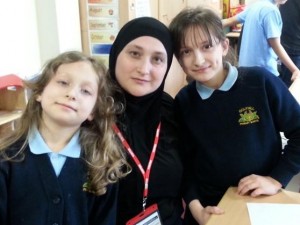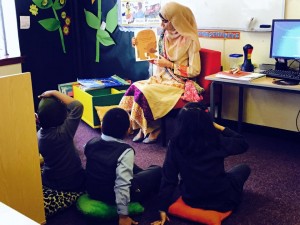
The most important reason to promote parental involvement in their children’s education is because it helps children to thrive. We have been speaking to parents, teachers and other professionals who all recognise the huge impact that having parents working with the school as part of the school community makes to the children. As one teacher said “confident individuals, guaranteed!”
However we haven’t done much work listening to the children’s point of view. As part of the film we made with the wonderful students from City of Glasgow College’s television department we wanted to speak to children and hear their voices too. We were lucky enough to be able to speak to two groups of children from Golfhill Primary and St Albert’s Primary. I think we found some future film stars and got some lovely footage of the children’s faces lighting up when they talked about how their parents got involved.
 Golfhill Learning Together Club
Golfhill Learning Together Club
In Golfhill children from the Learning Together club (run by the EAL teacher Marilyn Gordon- see http://gatheredtogether.bemis.org.uk/?p=663) spoke about how they felt about their parents coming in to school. One young boy, whose older brother attends the group told us about a time when they acted out a play with puppets and then he and his brother read a story together “and the class stopped but I wanted to go on reading forever”. My favourite moment was when a girl was asked how she felt when her mum came into school said “I feel GENIUS!” (a word she had just learned in learning club).
The children we interviewed at St Albert’s were a mix of children whose parents were in the Parent Council, came to St Albert’s learning club or were involved in the bilingual story telling (to see some of the mothers from the story telling group go to http://gatheredtogether.bemis.org.uk/?p=854). The children spoke about feeling proud that their parents and that it showed them their parents cared and took an interest in them.
 Sadia reading to children at St Albert’s
Sadia reading to children at St Albert’s
It was great to be able to capture the positive stories and experience of children but we know that this isn’t the case for every child. After speaking to parents with the Rainbow Muslim Women’s group, who had some difficult experiences getting involved in their children’s education (go to http://gatheredtogether.bemis.org.uk/?p=878 to see Samina and Tasneem talking about their experiences). They suggested that we could also speak to children from within the Rainbow women’s group and we met with Niem and Nailah to hear their story.
Nailah said that she felt quite uncomfortable about her mother coming into school because English wasn’t her first language and she was worried what the teachers would think. She also talked about not wanting her parents to be involved and throwing letters from school in the bin. It can be really difficult for families who are new to Scotland (and parents who are new to English) to become involved in the school community and the dynamics between children and their parents can change because of the language barrier. Niem, Nailah’s younger brother, spoke about the difference that it made when his parents became involved after he was being bullied at school. He felt that the teachers listened to his parents more and also that when they do get involved it showed that they cared about him and how he was getting on at school. We made a podcast of their conversation- to hear Nailah and Niem just go to http://gatheredtogether.bemis.org.uk/?p=878
An article about Gathered Together has just been published in the AHDS magazine- for those of you who don’t subscribe you can see the full article by clicking here: AHDS Parental Participation
We just spent an afternoon at St Albert’s Primary school in Glasgow with their bilingual story-telling group. These are parents who are being trained to read stories in English and their mother tongue (Urdu) to children. St Albert’s has a huge ethnic minority population with most children coming from Pakistani and Asian families where both English and Urdu are spoken in the home.
When we met the group several of the parents spoke about their children not valuing Urdu and believing that English was “better”. The school has made a real effort to celebrate the different languages in the school- there are signs in Urdu all over the school and the bilingual story telling lets children hear their native language be used in school. We were able to join a group of children hearing “the very hungry caterpillar” in English and Urdu, the children were enthralled and eager to show that they knew words in Urdu. One of the ladies said that her daughter has started to boast to everyone that she speaks Urdu.
As well as encouraging children to use their mother tongue the bilingual story telling sends an important message to the parents. It shows that the school values and respects their cultures and helping them to feel a real part of the school community. To hear from the parents themselves and to see some of the story telling go to http://gatheredtogether.bemis.org.uk/?p=854
Language always come up in our training when talking about barriers to getting more involved. Not feeling able to talk to teachers or feeling nervous and worried about saying the wrong thing can make any contact with school stressful. In a recent session we did with deaf parents they highlighted that many parents would avoid them as they couldn’t use sign language. Missing out on the playground gossip that parents share can make these parents feel very isolated. We’ve recently heard a lot of stories of children being taken to school without Halloween costumes as parents weren’t aware that their children could dress up- this is really embarrassing for both parents and children and emphasises that they aren’t a part of the school community.
However more schools are starting to use texts to parents to remind them about important things (from in-service days to book fairs), much easier for parents to read than long letters and more likely to reach parents than school letters that can be left in school bags and forgotten. To help parents become more involved in the school it’s useful to have activities that everyone can get involved in. Oakgrove primary school in Glasgow recently needed help putting sand in their new sandpits and sent a text out to all parents asking for help. This was a simple activity that almost any parent could get involved in (Oakgrove is a very diverse school with over thirty languages spoken) and was just asking parents to help for a couple of hours on a Saturday morning. Almost sixty parents along with their families came along to help- creating a real sense of the school community as well as getting the sandpits ready in no time. Could your school use parents in this way?
The Scottish government recognises the value of speaking more than one language; Scotland however is behind many European countries in the area. To help address this and ensure that children in Scottish have the advantages of being able to speak other languages, the “1+2” policy is being rolled out.
“1+2” means that every child will speak their mother tongue and also have the opportunity to learn two additional languages. One of these languages will be taught from primary two until at least third year in secondary school and the other will be taught from primary five. We think that this can provide a great opportunity to teach languages that reflect the makeup of the school- such as Polish, Urdu or British Sign Language. Learning these languages can help children from ethnic minorities feel a part of the school- giving them the opportunity to speak to their Scottish friends in their native language, and creating the chance for their parents to get involved in the school. We already know about schools who have invited parents from ethnic minorities to come in and read stories in their native language or teach a class to count to 10 in Urdu and their children have blossomed in confidence.
From our recent session with deaf parents in Glasgow we know the difference it can make to parents as well for children to be learning their language. When we mentioned that British Sign Language was one of the languages that children could be taught their faces lit up- this could mean that children in the playground would be able to talk to them and give the parents a sense of being part of the school. However asking parents to teach their mother tongue can be a real challenge- standing in front of a class and teaching can be very daunting and we feel that support is needed to help parents develop the capacity to get involved in this way.
From working with language schools we know that many of them would be very interested in making closer links with local schools, including the Glasgow Chinese School. The “1+2” policy brings a lot of potentially great opportunities to get parents from ethnic minorities more involved in their children schools, but we recognise that there will need to be a lot of support in place to help make it a reality over the next few years.